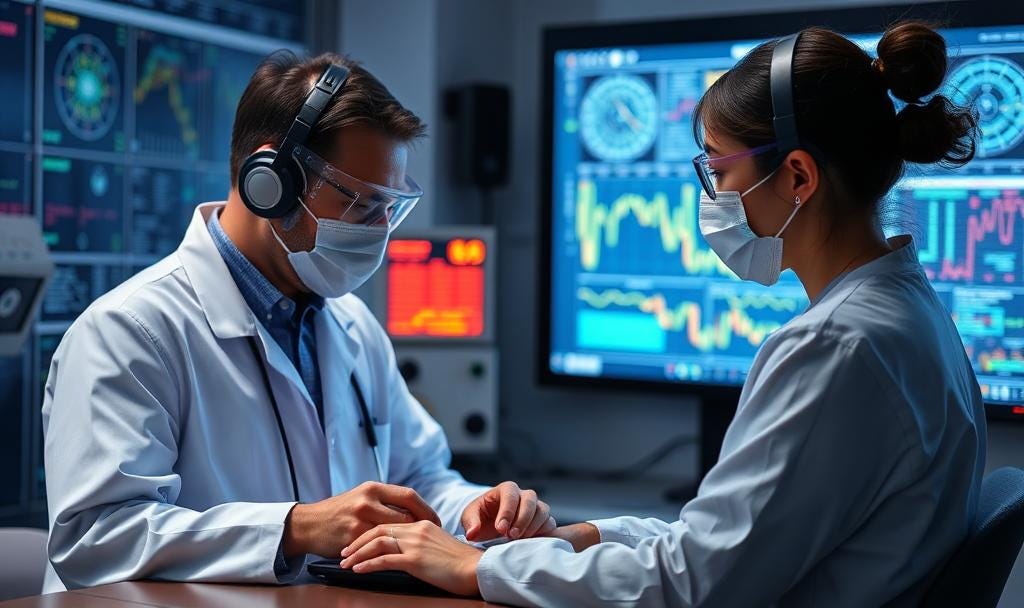TechBio and Preliminary Diagnosis (part I)
MetaphysicalCells: A newsletter about Science, Technology and AI Drug Discovery
Hi everyone 👋 and welcome back to another edition of MetaphysicalCells 🛸 only for paid subscribers, this time is all about Preliminary Diagnosis (progress so far and specific companies in Europe):
⏩ TechBio and Preliminary Diagnosis (part I) (🔐),
III and IV part in the next two weeks.
TechBio and Preliminary Diagnosis: Progress So Far (part I)
In the context of Preliminary Diagnosis, TechBio plays a crucial role by enabling faster, more accurate, and cost-effective methods of detecting diseases at an early stage. For example, AI algorithms can analyze vast amounts of patient data (e.g., medical history, genetic information, lifestyle factors) to predict the likelihood of diseases such as cancer, diabetes, or cardiovascular conditions; ML models are used to interpret medical imaging data (X-rays, MRIs, CT scans) with accuracy comparable to or even surpassing human experts; and NLP (Natural Language Processing) tools extract insights from unstructured data like doctors' notes, research papers, or patient-reported symptoms to support diagnostic decisions.
Here's how TechBio has transformed Preliminary Diagnosis so far ➡️
Google DeepMind Health developed an AI system trained on thousands of mammograms to detect early signs of breast cancer. The model outperformed human radiologists in identifying cancerous lesions, reducing false positives and false negatives. To give another example, AI algorithms like those from Aidoc Clinical AI Company, an Israeli technology company, have allowed to develop computer-aided simple triage and notification systems. Aidoc has obtained FDA and CE mark approval for its stroke, pulmonary embolism, cervical fracture, intracranial hemorrhage, intra-abdominal free gas, and incidental pulmonary embolism algorithms. In January 2025, Aidoc Announced Collaboration with AWS to Advance Clinical AI Foundation Models, Transforming Healthcare at Scale.
Zebra Medical Vision also from Israel is an AI-based imaging analytics for early detection of diseases like osteoporosis, liver disease, and cardiovascular conditions. In 2021, In an up-to $200M Acquisition by Nanox, Zebra Medical Vision Brought Its AI to Reimagine Radiology Globally.
Apps like SkinVision utilize AI to analyze skin lesions from smartphone photos, helping users detect melanoma early. In particular, SkinVision in Amsterdam, Netherlands is a regulated medical service that empowers people to take a more active role in their skin’s health. The SkinVision app, which is at the core of their service, enables you to check your skin for the most common types of skin cancer from the comfort of your smartphone 📲. In 2024, Medicash has confirmed its 1,000th clinically validated case of skin cancer among its policyholders since partnering with SkinVision in 2020 (Medicash detects 1,000th skin cancer via SkinVision). The app enables users to monitor moles and skin lesions by submitting photos for risk assessments based on clinical criteria, with dermatologists verifying the results (Smart Phone App Uses Machine Learning To Triage Skin Cancers).
Boston Massachusetts-based PathAI AI-powered pathology for cancer and other diseases leverages ML to assist pathologists in analyzing tissue samples. Their AI models can identify subtle patterns in histopathological slides that might be missed by the human eye, leading to more accurate diagnosis of diseases like cancer. On January 23, 2025, PathAI announced a strategic partnership 🤝 with Discovery Life Sciences, a leading biospecimens and specialty lab testing company, to offer Discovery’s customers enhanced, AI-enabled digital and quantitative insights from biospecimens to better inform drug and diagnostic development (PathAI Partners with Discovery Life Sciences to Deploy First AI-Powered Biospecimen Solutions). Through this partnership, Discovery will deploy PathAI’s AISight® Image Management System (IMS), ArtifactDetect and TumorDetect products across its biospecimens business.
Proscia in the US automates pathology workflows and enhances diagnostic speed and accuracy. Proscia makes digital pathology software and AI applications for cancer diagnosis and is considered a leader in digital and computational pathology solutions. Proscia’s Concentriq® digital pathology platform works with every leading WSI scanner on the market today and its open API centralizes all your pathology data in one place making it more accessible and driving insight into your routine practice. Finally, users can launch any AI application from the Concentriq platform and power computational pathology at every organization. The Concentriq Embeddings program relies on AI models to deliver numerical representations of whole-slide images, simplifying the process of feeding them into algorithms for computing cancer risk scores and image classifiers. Overall, this eliminates the steps of data migration, processing and image standardization in AI development. Just a month ago (March 2025), Proscia raised $50M 💰 for AI-driven pathology.




